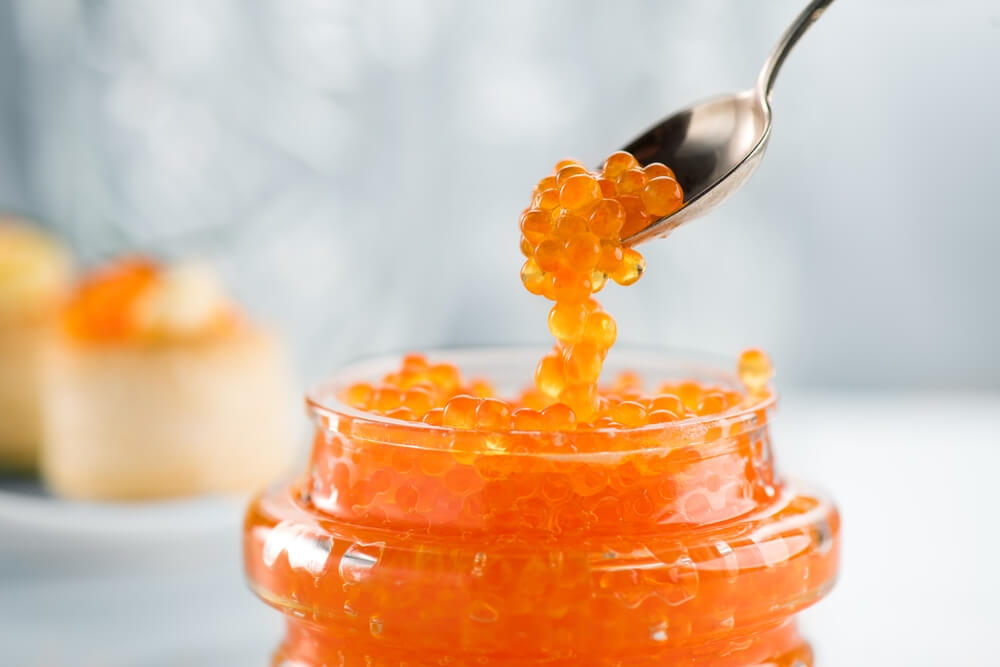
Fish eggs, often referred to as roe, are a culinary delight that has been savored for centuries across various cultures. Among the most renowned types of fish eggs is caviar, which comes from sturgeon species and is celebrated for its luxurious taste and texture. However, beyond their gourmet appeal, fish eggs offer impressive nutritional benefits that make them a valuable addition to any diet.
The nutritional value of fish eggs is significant; they are rich in essential omega-3 fatty acids, which are crucial for heart health and brain function. Additionally, they provide a good source of high-quality protein, vitamins D and B12, selenium, and other vital nutrients that support overall well-being.
In the culinary world, fish eggs are prized not only for their unique flavors but also for their versatility as an ingredient. They can be used to elevate dishes with their distinct taste and texture. As more people discover the benefits of incorporating fish eggs into their meals, this nutritious and gourmet ingredient continues to gain popularity among chefs and home cooks alike.
The Nutritional Profile of Fish Eggs
Fish eggs, often referred to as roe or caviar, are gaining recognition for their impressive nutritional profile, earning them the status of a superfood. One of the standout components of fish eggs is their high concentration of omega-3 fatty acids. These essential fats play a crucial role in maintaining heart health, reducing inflammation, and supporting brain function. Incorporating omega-3s into your diet can have significant long-term health benefits.
In addition to healthy fats, fish eggs are an excellent source of protein. The protein in fish eggs is not only abundant but also high-quality, providing all the essential amino acids necessary for muscle repair and growth. This makes them an ideal dietary choice for those looking to boost their protein intake without consuming large amounts of meat.
Fish eggs also boast a wealth of vitamins and minerals that contribute to their superfood status. They are rich in vitamins A and D and contain significant amounts of B vitamins that support energy production and neurological function. Moreover, minerals such as selenium and zinc found in caviar play vital roles in immune system support and antioxidant protection.
Overall, the combination of omega-3 fatty acids, high-quality protein, essential vitamins, and vital minerals makes fish eggs a nutrient-dense food that can enhance a balanced diet while offering numerous health benefits. Whether enjoyed as an occasional treat or incorporated regularly into meals, fish eggs provide powerful nutritional advantages worth considering.
Top Health Benefits of Consuming Fish Eggs

Fish eggs, often referred to as roe, are not only a delicacy for many but also a powerhouse of nutrients that offer numerous health benefits. One of the most significant advantages of consuming fish eggs is their positive impact on heart health. Rich in omega-3 fatty acids, particularly EPA and DHA, fish eggs can help reduce the risk of cardiovascular diseases by lowering blood pressure and decreasing triglyceride levels.
In addition to heart health benefits, fish eggs are known for their brain health improvement properties. The omega-3s found in roe play a crucial role in maintaining cognitive function and may even help reduce the risk of neurodegenerative diseases such as Alzheimer’s. This makes them an excellent dietary choice for those looking to support their brain function throughout life.
Fish eggs also possess impressive anti-inflammatory properties. The presence of omega-3 fatty acids helps reduce inflammation in the body, which can be beneficial for individuals suffering from chronic inflammatory conditions like arthritis. By incorporating fish eggs into your diet, you may experience reduced joint pain and improved mobility.
Lastly, consuming fish eggs can provide an immune system boost due to their rich content of vitamins A and D as well as essential minerals like zinc and selenium. These nutrients work together to enhance immune response and protect against infections.
Incorporating fish eggs into your diet can be a delicious way to reap these remarkable health benefits while enjoying a unique culinary experience.
How to Incorporate Fish Eggs into Your Diet
Fish eggs, commonly known as caviar or roe, are a delicacy that can add a burst of flavor and elegance to various dishes. Cooking with caviar and incorporating fish roe into your diet can be both exciting and rewarding, offering a unique culinary experience.
When it comes to recipes with fish roe, simplicity is often key. Caviar’s delicate texture and distinct taste make it an ideal topping for blinis or toast points with a dollop of crème fraîche. This classic combination allows the flavors of the caviar to shine while providing a satisfying contrast in textures.
For those looking to explore more adventurous serving suggestions for caviar and roe dishes, consider adding them as garnishes to creamy pasta or risotto. The subtle saltiness of the roe complements rich sauces beautifully, creating a harmonious balance that elevates the entire dish.
Another delightful way to incorporate fish eggs is by using them in sushi rolls or sashimi platters. The pop of color from salmon roe (ikura) or tobiko adds visual appeal while enhancing the umami profile of these Japanese favorites.
Whether you’re new to cooking with caviar or an experienced enthusiast seeking fresh ideas, experimenting with these luxurious ingredients can transform everyday meals into extraordinary culinary experiences.
Differentiating Between Types of Fish Eggs (Caviar vs Roe)
When it comes to gourmet delicacies, few items capture the imagination quite like fish eggs. However, not all fish eggs are created equal. Understanding the differences between caviar and roe can enhance your culinary experiences and appreciation for these unique products.
Caviar is specifically sourced from sturgeon species, with beluga, osetra, and sevruga being the most prized varieties. The process of harvesting sturgeon caviar is meticulous; the eggs are carefully extracted, salted, and cured to produce their signature rich flavor and luxurious texture.
In contrast, roe is a more general term that refers to all types of fish eggs other than those from sturgeon. Among popular choices are salmon roe (also known as ikura) and trout roe. Salmon roe is notable for its large size and vibrant orange color, delivering a burst of briny flavor that pairs well with sushi or can be enjoyed on its own. Trout roe offers a slightly milder taste compared to salmon but still provides a delightful pop when eaten.
The distinctions between these types of fish eggs lie not only in their source species but also in their flavor profiles, textures, and culinary uses. Sturgeon caviar’s exclusivity often makes it a luxury item reserved for special occasions or high-end dining experiences. Meanwhile, salmon and trout roes are more accessible yet still offer an exquisite touch to various dishes.
By understanding these differences, you can make informed choices about which type best suits your palate or complements your meal planning needs. Whether you’re indulging in the opulence of true caviar or exploring the versatile flavors of different roes, each type holds its own unique appeal within the world of gourmet cuisine.
Sustainable Sourcing and Ethical Considerations for Eating Fish Eggs
When it comes to enjoying the delicacy of fish eggs, commonly known as caviar and roe, it’s important to consider both sustainability and ethical sourcing. The fishing industry plays a crucial role in maintaining ecological balance, and sustainable practices are key to preserving our oceans for future generations.
Sustainability in the fishing industry means implementing methods that do not deplete fish populations or damage their habitats. This includes adhering to quotas set by regulatory bodies, using environmentally friendly fishing gear, and avoiding overfishing. For caviar and roe enthusiasts, choosing products from sources that prioritize these sustainable practices is essential.
Ethical sourcing of caviar and roe involves ensuring that the harvesting processes respect both environmental standards and social responsibilities. This means selecting suppliers who practice transparency in their operations, support local communities by providing fair wages, and avoid illegal poaching or unregulated fishing activities.
By being informed about sustainability in the fishing industry and prioritizing ethical sourcing of caviar and roe, consumers can enjoy these luxurious products while contributing positively to the health of our oceans. Supporting brands that value these principles not only enhances your culinary experience but also promotes a more responsible approach to seafood consumption.
Conclusion-Embrace the Rich Flavors and Health Perks of Fish Eggs Today!
Fish eggs, often known as roe, are a culinary delight that many cultures have cherished for centuries. These tiny pearls of the sea not only offer a burst of unique flavors but also come packed with an array of health benefits. Rich in omega-3 fatty acids, fish eggs contribute to heart health, reduce inflammation, and support brain function. They are also an excellent source of high-quality protein and essential vitamins such as B12 and D.
Incorporating fish eggs into your diet can be a delicious way to enhance your meals while boosting your nutritional intake. Whether sprinkled over sushi or served as a luxurious caviar appetizer, these nutrient-dense gems add both texture and taste to any dish.
As more people become aware of the health advantages associated with consuming fish eggs, their popularity continues to rise. So why not explore the diverse world of roe today? By embracing this delicacy, you can enjoy its rich flavors while reaping substantial health rewards.



